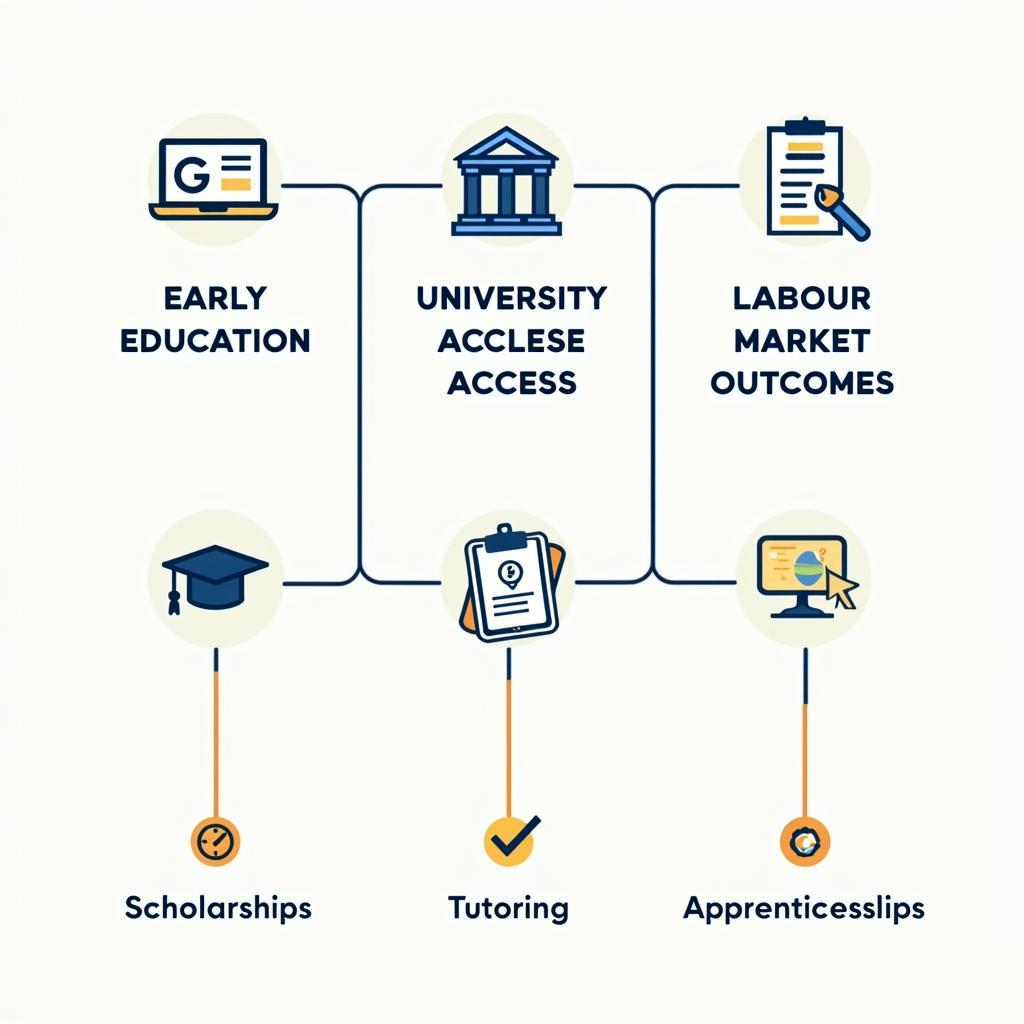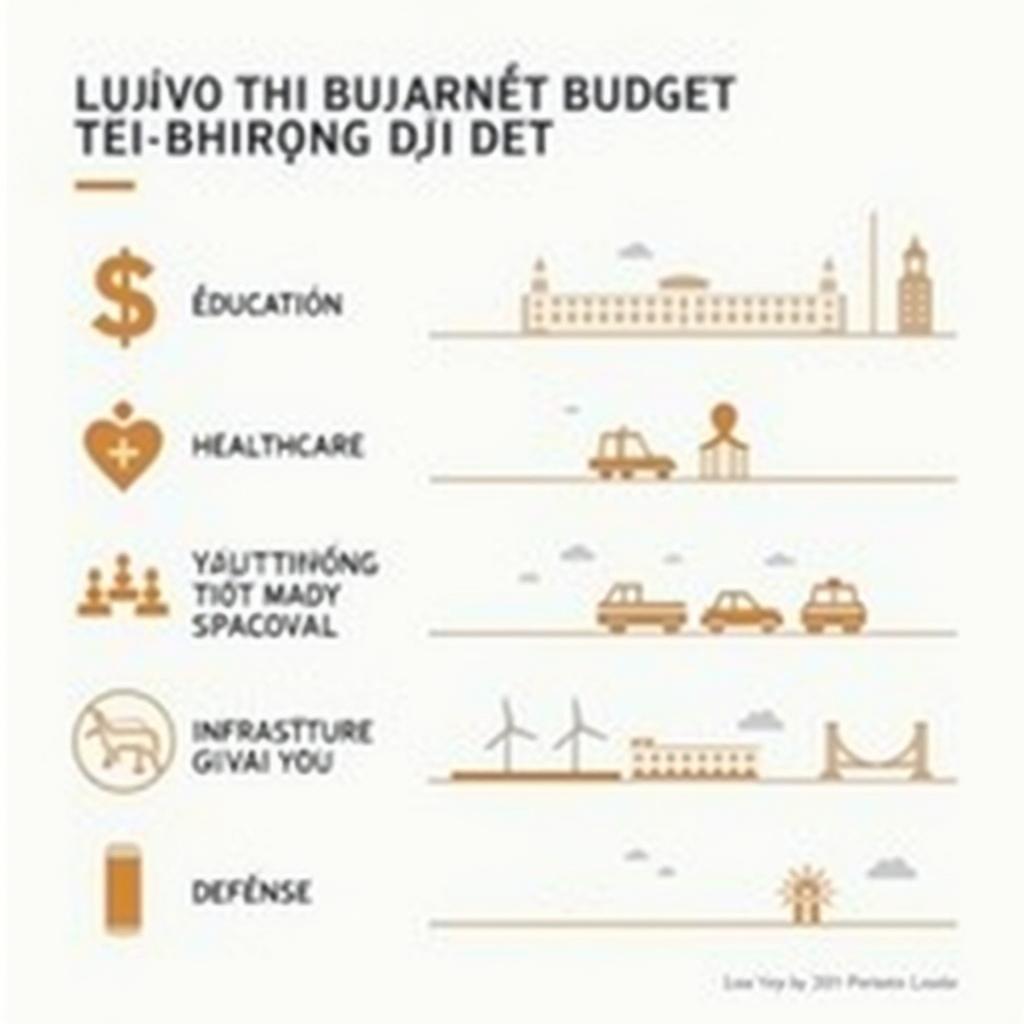Mở bài
“The Role Of Education In Promoting Social Mobility” (vai trò của giáo dục trong thúc đẩy dịch chuyển xã hội) là chủ đề xuất hiện lặp lại trong IELTS Writing Task 2 dưới nhiều biến thể: miễn học phí đại học, bình đẳng cơ hội tiếp cận giáo dục, học bổng theo nhu cầu… Lý do rất rõ ràng: giáo dục là “đòn bẩy” quan trọng nhất để phá vỡ vòng luẩn quẩn nghèo đói và nâng cao bình đẳng. Trong bài viết này, bạn sẽ học được 3 bài mẫu (Band 5-6, 6.5-7, 8-9), phân tích chấm điểm chi tiết theo 4 tiêu chí, từ vựng chủ đề, 6 cấu trúc câu dễ ăn điểm, và checklist tự đánh giá.
Một số đề thi thực tế liên quan (được xác minh từ nguồn uy tín):
- IELTS Liz: “University education should be free for everyone. To what extent do you agree or disagree?” (chủ đề miễn học phí và bình đẳng cơ hội)
- IELTS-Blog: “Education is the single most important factor in the development of a country. To what extent do you agree or disagree?” (giáo dục, bất bình đẳng và phát triển)
- British Council/IDP các năm gần đây thường xuất hiện biến thể về “access to education”, “free tertiary education”, “scholarships and equality of opportunity”.
Trong phần chính, tôi sẽ chọn biến thể phổ biến nhất để phân tích sâu, đồng thời liên hệ chặt chẽ với The role of education in promoting social mobility để bạn có thể dễ dàng tùy biến cho mọi đề gần chủ đề này.
 Vai trò giáo dục trong thúc đẩy dịch chuyển xã hội trong IELTS Writing Task 2
Vai trò giáo dục trong thúc đẩy dịch chuyển xã hội trong IELTS Writing Task 2
1. Đề Writing Part 2
University education should be free for everyone. To what extent do you agree or disagree?
Dịch đề: Giáo dục đại học nên miễn phí cho tất cả mọi người. Bạn đồng ý hay không đồng ý ở mức độ nào?
Phân tích đề bài:
- Dạng câu hỏi: Opinion (To what extent do you agree or disagree?). Bạn có thể chọn: hoàn toàn đồng ý, hoàn toàn không đồng ý, hoặc quan điểm cân bằng (partly agree).
- Thuật ngữ quan trọng:
- “University education”: giáo dục bậc đại học (tertiary education).
- “Free for everyone”: miễn học phí cho tất cả, ngụ ý bình đẳng cơ hội.
- Lỗi thường gặp:
- Lạc đề sang “giáo dục tiểu học/trung học”.
- Chỉ nêu cảm tính, thiếu luận cứ chính sách (ví dụ: học bổng theo nhu cầu, means-tested grants, chi phí cơ hội).
- Dùng ví dụ chung chung, không giải thích cơ chế “làm thế nào” giáo dục thúc đẩy dịch chuyển xã hội (social mobility).
- Cách tiếp cận chiến lược:
- Xác định lập trường rõ: free-for-all, hay free-for-some (need-based), hay không miễn nhưng hỗ trợ mạnh (loans/grants).
- Phân tích chi phí – lợi ích – công bằng: ảnh hưởng tới ngân sách, chất lượng, khả năng tiếp cận nhóm yếu thế, và tác động dài hạn tới bất bình đẳng thu nhập.
- Đưa ví dụ chính sách cụ thể: học bổng theo nhu cầu, miễn học phí có điều kiện, hỗ trợ sinh hoạt phí, đầu tư giáo dục mầm non, tư vấn nghề.
- Liên kết chủ đề với The role of education in promoting social mobility: cơ chế “level the playing field”, “break the cycle of poverty”.
2. Bài mẫu Band 8-9
Giới thiệu: Bài Band 8-9 cần lập luận mạch lạc, phát triển ý sâu, ví dụ/luận cứ thuyết phục, từ vựng học thuật chính xác và phạm vi ngữ pháp đa dạng.
Bài luận (291 từ):
Higher education can be a powerful engine of social mobility, but making it universally free is neither the only nor the most efficient way to equalise life chances. I partly agree that tuition should be removed for those who would otherwise be priced out; however, a blanket policy risks unintended consequences and budgetary waste.
First, free-for-all tuition does not automatically level the playing field. Students from affluent families already possess advantages—stronger schooling, informed guidance, and social capital—so they would disproportionately capture university seats even when fees are abolished. If the aim is to promote upward mobility, a more surgical approach—such as means-tested grants, targeted bursaries, and living-cost stipends—more directly removes the binding constraints that deter low-income youth.
Second, equity without quality is an empty promise. When governments stretch budgets to fund universal free tuition, class sizes can swell and resources per student may fall, undermining teaching quality and graduate outcomes. It is more prudent to prioritise early-childhood and K–12 improvements, because remedial spending at university cannot fully compensate for years of unequal preparation. Early investment narrows achievement gaps before they harden, thereby expanding the pool of disadvantaged students who can realistically succeed in higher education.
Third, mobility depends on labour-market structures. Credential inflation and skills mismatches mean that degrees do not always translate into earnings gains for the poorest. Alongside financial aid, career counselling, apprenticeships, and industry-linked curricula can ensure qualifications yield genuine opportunity.
In conclusion, education is central to promoting social mobility, but universal free tuition is a blunt instrument. A needs-based financing model, coupled with earlier interventions and demand-driven programmes, can better level the playing field while safeguarding quality and fiscal sustainability.
Phân tích Band điểm
| Tiêu chí | Band | Nhận xét |
|---|---|---|
| Task Response (Hoàn thành yêu cầu) | 8.5 | Trả lời trực diện, nêu lập trường “partly agree”, phát triển 3 luận điểm rõ ràng, liên hệ mục tiêu social mobility. Có khuyến nghị chính sách cụ thể (means-tested grants, early investment). |
| Coherence & Cohesion (Mạch lạc & Liên kết) | 8.0 | Mở–thân–kết chặt chẽ; chủ đề câu rõ; liên kết logic bằng therefore/however/alongside. Có dùng tham chiếu và sự lặp có chủ đích. Có thể đa dạng hóa thêm linking ở đoạn 3. |
| Lexical Resource (Từ vựng) | 8.5 | Từ vựng học thuật chính xác: means-tested, bursaries, credential inflation, skills mismatch, fiscal sustainability. Collocations tự nhiên, ít lặp. Độ chính xác cao. |
| Grammatical Range & Accuracy (Ngữ pháp) | 8.0 | Câu phức, mệnh đề quan hệ, cụm phân từ, điều kiện; dấu câu hợp lý. Có vài câu dài nhưng kiểm soát tốt. Không lỗi ngữ pháp đáng kể. |
Các yếu tố giúp bài này được chấm điểm cao
- Lập trường rõ ràng (partly agree) và xuyên suốt.
- Luận cứ cấp chính sách cụ thể, không chung chung: means-tested grants, living-cost stipends.
- Kết nối giáo dục với thị trường lao động (credential inflation, skills mismatch).
- Nhấn mạnh chất lượng và công bằng đồng thời, tránh “free-for-all” đơn giản.
- Từ vựng học thuật chính xác, collocations tự nhiên.
- Cấu trúc câu đa dạng: điều kiện giả định, cụm phân từ, mệnh đề quan hệ.
- Kết luận đề xuất mô hình thay thế rõ: needs-based + early interventions.
 Chiến lược viết IELTS Task 2 về giáo dục và dịch chuyển xã hội
Chiến lược viết IELTS Task 2 về giáo dục và dịch chuyển xã hội
3. Bài mẫu Band 6.5-7
Giới thiệu: Bài Band 6.5-7 có lập luận tương đối rõ, ví dụ phù hợp, từ vựng và ngữ pháp khá nhưng chưa thật tinh tế; có thể lặp từ hoặc liên kết chưa thật mượt.
Bài luận (262 từ):
Many people argue that university should be free, because it can help poor students study and improve their lives. I agree to some extent, but I believe that completely free tuition is not the best solution for every country.
Firstly, free university can support students from low-income families to enter higher education without fear of fees. This could increase equality and open the door to social mobility. However, if everyone studies for free, government budgets may face pressure, and universities might suffer from large classes and fewer resources. In that case, quality may drop, which does not help graduates find good jobs.
Secondly, financial cost is not the only barrier. Some students lack good academic preparation or information about courses and careers. Therefore, scholarships and living allowances for the poor are helpful, but they should be combined with better secondary education and career counselling. With these measures, disadvantaged students are more likely to succeed at university and in the labour market.
Finally, the value of degrees also depends on demand. If too many people study popular majors, there can be a mismatch between skills and jobs. To avoid this, governments and universities should work with employers to design programmes and internships that lead to real opportunities.
In conclusion, making university free for all may sound fair, but it is not always efficient. A more balanced policy—supporting those in need while improving earlier schooling and labour links—can promote equality and social mobility more effectively.
Phân tích Band điểm
| Tiêu chí | Band | Nhận xét |
|---|---|---|
| Task Response (Hoàn thành yêu cầu) | 7.0 | Trả lời đúng yêu cầu, có quan điểm rõ và lý do. Thiếu ví dụ minh họa cụ thể theo bối cảnh/điều kiện chính sách; phần giải thích còn khái quát. |
| Coherence & Cohesion (Mạch lạc & Liên kết) | 6.5 | Bố cục hợp lý, có các từ nối cơ bản. Một số đoạn chuyển ý còn đơn giản; chủ đề câu đôi lúc chung chung. |
| Lexical Resource (Từ vựng) | 6.5 | Từ vựng đủ dùng (barrier, allowance, mismatch), nhưng vẫn lặp từ education/university/poor. Collocation chưa đa dạng. |
| Grammatical Range & Accuracy (Ngữ pháp) | 6.5 | Câu phức có sử dụng, song cấu trúc còn an toàn. Vài câu dài nhưng vẫn kiểm soát được. Ít lỗi nhỏ. |
So sánh với bài Band 8-9
- Bài 8-9 đưa giải pháp chính sách cụ thể và sâu (means-tested, early-childhood); bài 6.5-7 chỉ nêu chung “scholarships”, “counselling”.
- Từ vựng học thuật ở 8-9 đa dạng, chính xác; 6.5-7 còn lặp và ít collocations.
- Cấu trúc phức tạp, lập luận đa chiều (chất lượng – công bằng – thị trường lao động) rõ hơn ở 8-9.
- Mức độ tinh tế: 8-9 chỉ ra hệ quả không mong muốn (crowding, quality dilution), 6.5-7 ít chiều sâu.
4. Bài mẫu Band 5-6
Giới thiệu: Bài Band 5-6 thường có lập luận đơn giản, ví dụ mơ hồ, từ vựng hạn chế, lỗi ngữ pháp/đánh dấu câu; dễ off-topic hoặc lặp ý.
Bài luận (258 từ):
Many people think university should be free for all people. I completely agree because free education will solve many problems. Firstly, all students can go to university and then society becomes equal. Poor students will not worry about money and they will study hard. Secondly, if everyone get degrees, the economy will grow very fast because all workers are highly educated. Also government will not spend money on other things because people will have good jobs and pay taxes.
However, some people say free university is too expensive. I think this is not true because education always bring benefits. When fees are removed, more people will be successful, so crime and unemployment is reduced. Universities can accept more students easily and teachers can handle big classes. Students don’t need living cost support because they can do part-time jobs and learn time management. In my opinion, making university free is the best solution and there is not many disadvantages.
In conclusion, free university is good for everyone and for the country. It is clear to see that free education will make social mobility very fastly. Therefore governments should pay the tuition for all students and this will create a better future for all of us.
Phân tích Band điểm
| Tiêu chí | Band | Nhận xét |
|---|---|---|
| Task Response (Hoàn thành yêu cầu) | 5.5 | Có quan điểm nhưng lập luận một chiều, quá khẳng định, thiếu bằng chứng/thực tế. Một số ý chưa hợp lý. |
| Coherence & Cohesion (Mạch lạc & Liên kết) | 5.5 | Lặp ý, liên kết cơ học, thiếu phát triển logic. Một số câu chủ đề mơ hồ. |
| Lexical Resource (Từ vựng) | 5.5 | Từ vựng hạn chế, lặp từ, collocations yếu; có dùng sai từ (fastly). |
| Grammatical Range & Accuracy (Ngữ pháp) | 5.0 | Lỗi chủ-vị, mạo từ, số nhiều, thì; dấu câu chưa chuẩn; cấu trúc câu đơn giản. |
Những lỗi sai của bài – phân tích & giải thích
| Lỗi sai | Loại lỗi | Sửa lại | Giải thích |
|---|---|---|---|
| all students can go to university and then society becomes equal | Lập luận quá đà | all students can attend university, which may improve equality, but not guarantee it | “Becomes equal” là khẳng định tuyệt đối, thiếu logic. |
| if everyone get degrees | Ngữ pháp (chia động từ) | if everyone gets degrees | “Everyone” là số ít; động từ phải chia ngôi 3 số ít. |
| Also government will not spend money on other things | Lập luận sai | governments may reallocate spending, but other priorities still exist | Lý luận thiếu cơ sở, khái quát hóa quá mức. |
| education always bring benefits | Ngữ pháp (chia động từ) | education always brings benefits | Chủ ngữ số ít. |
| crime and unemployment is reduced | Chủ-vị | crime and unemployment are reduced | Chủ ngữ số nhiều. |
| teachers can handle big classes | Tính hợp lý | large classes may strain quality | Lý luận ngược; lớp quá đông thường giảm chất lượng. |
| Students don’t need living cost support | Nội dung | many still need living-cost support | Thiếu hiểu biết thực tế. |
| social mobility very fastly | Từ vựng/ngữ pháp | social mobility very quickly / rises rapidly | “Fastly” không dùng; dùng “quickly/rapidly”. |
Cách Cải Thiện Từ Band 6 Lên Band 7
- Tránh khẳng định tuyệt đối; thêm cụm hedging: may, can, tends to.
- Bổ sung bằng chứng/cơ chế: vì sao miễn học phí giúp nhóm nghèo? nêu “means-tested grants, living-cost stipends”.
- Đa dạng từ vựng học thuật và collocations: level the playing field, break the cycle of poverty.
- Kiểm tra chủ-vị, mạo từ (a/an/the), số ít/số nhiều, giới từ.
- Viết chủ đề câu rõ, mỗi đoạn một luận điểm chính, có ví dụ/giải thích.
- Dùng cấu trúc câu phức vừa phải để tăng điểm ngữ pháp.
5. Từ vựng quan trọng cần nhớ
| Từ/Cụm từ | Loại từ | Phiên âm | Nghĩa tiếng Việt | Ví dụ (English) | Collocations |
|---|---|---|---|---|---|
| social mobility | n. | /ˌsəʊʃl məˈbɪləti/ | dịch chuyển xã hội | Education can boost social mobility. | promote/hamper social mobility |
| upward mobility | n. | /ˈʌpwəd məˈbɪləti/ | dịch chuyển đi lên | Scholarships foster upward mobility. | foster/dramatically limit |
| equality of opportunity | n. | /ɪˈkwɒləti əv ˌɒpəˈtjuːnəti/ | bình đẳng cơ hội | We must ensure equality of opportunity. | ensure/undermine |
| level the playing field | v. phr. | — | tạo sân chơi bình đẳng | Grants can level the playing field. | effectively/partially level |
| means-tested grant | n. | /ˈmiːnz ˌtɛstɪd ɡrɑːnt/ | trợ cấp theo nhu cầu | A means-tested grant targets the poor. | provide/expand means-tested grants |
| bursary | n. | /ˈbɜːsəri/ | học bổng trợ cấp | A bursary covered her living costs. | award/offer bursaries |
| tuition waiver | n. | /tjuːˈɪʃn ˈweɪvə(r)/ | miễn học phí | He received a tuition waiver. | grant/qualify for a tuition waiver |
| credential inflation | n. | /krɪˈdɛnʃl ɪnˈfleɪʃn/ | lạm phát bằng cấp | Credential inflation reduces the value of degrees. | suffer from/avoid |
| skills mismatch | n. | /skɪlz ˈmɪsmætʃ/ | lệch pha kỹ năng | The economy faces a skills mismatch. | address/reduce |
| wage premium | n. | /weɪdʒ ˈpriːmiəm/ | phần chênh lương do bằng cấp | The degree wage premium is shrinking. | earn/enjoy a wage premium |
| break the cycle of poverty | v. phr. | — | phá vỡ vòng nghèo đói | Education can break the cycle of poverty. | effectively/gradually break |
| allocate funding | v. phr. | /ˈæləkeɪt ˈfʌndɪŋ/ | phân bổ ngân sách | Governments must allocate funding wisely. | adequately/properly allocate |
| by the same token | linker | — | tương tự như vậy | By the same token, access must be fair. | — |
| notwithstanding | linker | /ˌnɒtwɪðˈstændɪŋ/ | mặc dù | Notwithstanding the cost, aid is vital. | — |
| spur/foster (promote) | v. | /spɜː(r)/ /ˈfɒstə(r)/ | thúc đẩy | Grants can foster mobility. | spur innovation/foster inclusion |
Lưu ý phát âm: luyện IPA và nhấn âm đúng để ghi nhớ lâu.
6. Cấu trúc câu dễ ăn điểm cao
- Câu phức với mệnh đề phụ thuộc
- Công thức: Mệnh đề chính + liên từ phụ thuộc (because/when/if/although) + mệnh đề phụ.
- Ví dụ từ bài Band 8-9: If the aim is to promote upward mobility, a more surgical approach…
- Vì sao ghi điểm: Nêu rõ điều kiện/mối quan hệ nhân quả -> tăng mạch lạc.
- Ví dụ bổ sung:
- If fees are abolished, low-income students may still face living costs.
- Although tuition is free, quality may deteriorate.
- Lỗi thường gặp: Quên chia động từ trong mệnh đề chính/phụ; dùng “because of” + mệnh đề (sai). Hãy dùng “because” + mệnh đề, “because of” + danh từ/cụm danh từ.
- Mệnh đề quan hệ không xác định (non-defining relative clause)
- Công thức: Danh từ, which/who + mệnh đề, …
- Ví dụ: means-tested grants, which directly remove financial barriers, are effective.
- Lý do: Bổ sung thông tin tinh tế, giúp ý giàu chiều sâu.
- Ví dụ bổ sung:
- Early-childhood education, which shapes long-term outcomes, deserves priority.
- Apprenticeships, which connect study with work, improve employability.
- Lỗi thường gặp: Quên dấu phẩy; dùng that thay cho which trong mệnh đề không xác định.
- Cụm phân từ (participial phrase)
- Công thức: V-ing/V-ed + cụm bổ nghĩa, …
- Ví dụ: Stretching budgets to fund universal free tuition, governments may dilute quality.
- Lý do: Cô đọng, tăng tính học thuật.
- Ví dụ bổ sung:
- Facing rising enrolments, universities may increase class sizes.
- Designed poorly, loans can burden graduates.
- Lỗi thường gặp: Treo chủ ngữ (dangling modifier) – phải đảm bảo chủ ngữ sau cụm phân từ chính là “thực hiện” hành động đó.
- Câu chẻ (Cleft sentences)
- Công thức: It is/was + X + that/who + mệnh đề.
- Ví dụ: It is targeted support that levels the playing field most effectively.
- Lý do: Nhấn mạnh luận điểm chính.
- Ví dụ bổ sung:
- It is early intervention that narrows achievement gaps.
- It is labour-market alignment that converts degrees into mobility.
- Lỗi thường gặp: Dùng sai đại từ quan hệ; thiếu mệnh đề hoàn chỉnh sau “that”.
- Câu điều kiện nâng cao (mixed/third/zero)
- Công thức: If + past perfect, would + have + V3… / If + V, V (zero).
- Ví dụ: If tuition were abolished universally, quality could suffer.
- Lý do: Giả định chính sách, phân tích hệ quả -> thuyết phục.
- Ví dụ bổ sung:
- If aid had been means-tested, fewer funds would have been wasted.
- If demand exceeds capacity, standards fall.
- Lỗi thường gặp: Nhầm thì; dùng “would” trong mệnh đề if (sai).
- Đảo ngữ (Inversion)
- Công thức: Not only + trợ động + S + V, but also… / Rarely/Seldom/Never + trợ động + S + V…
- Ví dụ: Not only does early investment enhance equity, but it also improves quality.
- Lý do: Tăng nhấn mạnh và độ linh hoạt cấu trúc.
- Ví dụ bổ sung:
- Seldom is universal free tuition fiscally sustainable.
- Only by targeting aid can we maximise mobility.
- Lỗi thường gặp: Quên đảo trợ động; dùng sai thì khi đảo ngữ.
7. Checklist Tự Đánh Giá
- Trước khi viết:
- Xác định dạng câu hỏi (agree/disagree, discuss both, problem-solution).
- Chốt lập trường và 2-3 luận điểm chính liên quan social mobility.
- Ghi nhanh ví dụ/chính sách: means-tested grants, living-cost stipends, early-childhood investment.
- Trong khi viết:
- Mỗi đoạn một ý trung tâm, câu chủ đề rõ, giải thích cơ chế “vì sao”.
- Dùng ít nhất 3 collocations học thuật; 1-2 cấu trúc câu nâng cao.
- Kiểm tra mạo từ (a/an/the), chủ-vị, giới từ.
- Sau khi viết:
- Cắt câu quá dài; thêm từ nối mượt (therefore, nonetheless, by the same token).
- Soát lỗi thường gặp: lặp từ, fastly, everyone + gets.
- Đảm bảo 260-310 từ cho bài band cao, không thừa/thiếu.
- Mẹo quản lý thời gian:
- 5 phút lập dàn ý; 25 phút viết; 5 phút rà soát.
- Viết câu chủ đề trước, ví dụ sau; tránh đào sâu ví dụ khó trong phòng thi.
Kết bài
The role of education in promoting social mobility là chủ đề “xương sống” trong IELTS Writing Task 2, thường được kiểm tra qua các biến thể về miễn học phí, bình đẳng tiếp cận và hiệu quả chính sách. Bạn đã có 3 bài mẫu từ Band 5-6 tới Band 8-9, bảng chấm điểm chi tiết, bộ từ vựng học thuật và 6 cấu trúc câu ghi điểm. Con đường cải thiện nằm ở chỗ: xác định lập trường rõ, giải thích cơ chế tác động, đưa giải pháp cụ thể và kiểm soát ngôn ngữ chính xác. Hãy luyện 2-3 đề tương tự mỗi tuần, nhờ bạn học/chuyên gia phản hồi, và chỉnh sửa theo checklist. Thời gian cải thiện thực tế từ 6.5 lên 7.5 thường cần 4-8 tuần với luyện tập đều đặn.
Hãy bắt đầu bằng việc viết lại đề “University education should be free for everyone” với lập trường riêng của bạn và chia sẻ ở phần bình luận để nhận góp ý. Tài nguyên bổ trợ: [internal_link: chủ đề] để bạn mở rộng từ vựng và cấu trúc cho chủ đề giáo dục, bình đẳng và chính sách công.



[…] Để hiểu cách phát triển luận điểm về chính sách công trong các chủ đề gần gũi, bạn có thể tham khảo thêm phân tích về vai trò nhà nước trong giáo dục tại The role of education in promoting social mobility. […]